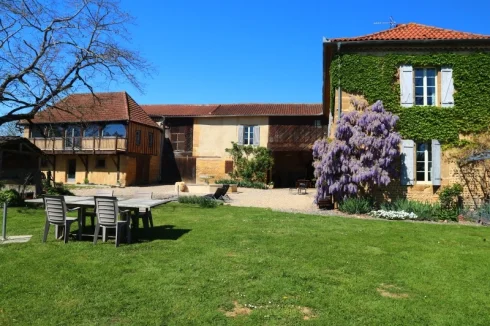Health Cover - Plus Ça Change...?
Thursday 01 September 2011
The recent Circular on health cover for early retirees may well be obtuse, but despite the cryptic language the rules really have changed.
Prior to the summer break we broke the news that the EU Commission had forced France to change the rules on granting early retirees access into the health system.
The new regulations are contained in a Circular issued in early July by the French health and social security authorities.
The Circulaire Nº DSS/DACI/2011/225 is a classic piece of French obscurification, leading a number of you who have read it to write to us seeking clarification on your own position.
The lack of clarity has not been helped by reports elsewhere, stating that, despite the initial euphoria, there has been ‘no change’ in the rules.
In order to try and shed more light we wrote to the EU, who provided us with the following statement:
'The Commission welcomes the central role that the new Circular (No. DSS/DACI\2011/225) of 9 June 2011 provides to Regulation (EC) No 883/2004 concerning coordination of social security rights in the EU in the assessment of a citizen's right of access to the French CMU (health insurance cover).
The new Circular requires the authorities to assess whether a person is habitually resident in France. This is consistent with the EU rules: when an EU national is habitually resident in France, he or she is entitled to equal treatment with French nationals as regards access to the CMU.
The Commission has still to take a decision on whether it will drop the infringement procedure.
The Commission will monitor carefully how this new Circular is applied in practice by the French authorities.'
Perhaps the most important sign in the statement that confirms things have changed are the words 'the Commission welcomes....the new Circular', but as if to underscore the ambiguous nature of the Circular (and the notoriously unreliable nature of France in the implementation of European legislation!), the Commission have yet to drop the infringement procedure, and will be monitoring implementation of the Circular.
Nevertheless, the level of mistrust that is apparent should not disguise the fact that France has been obliged to now grant access to the health system for those who are legally (habitually) resident in the country.
'Habitually Resident'
As the EU statement confirms, the formal legal position is actually a very clear one.
If an early retiree from within the EU is 'habitually resident' in France then they are entitled to be treated in the same way as a French national. This implies an equal right to access the health system.
In order to be considered ‘habitually resident’ you must be resident in France for at least three months, with health insurance cover and the minimum level of income.
Health insurance cover provided via an E106/S1 would meet the first criteria. At the expiry of the E106/S1 (up to 2 years) you would have obtained the status of being ‘habitually resident’, and so would be entitled to access the health system, subject to the test of minimum income.
Indeed, you need continuing health cover in order to remain legally resident.
All of this is actually stated in the new Circular, despite the convoluted manner in which it is expressed, particularly the so-called 'case by case' examination of all applications.
Thus, the guarantee of continuing health cover for those who are 'habitually resident' in France is confirmed in the Circular, where it states: 'l’application des règles européennes de coordination permettant d’assurer à une partie des personnes ayant établi leur résidence en France de bénéficier d’une continuité de leurs droits en matière de maladie-maternité, acquis dans un autre Etat membre, par le bénéfice des prestations de l’assurance maladie française.'
It goes on to say: 'Si l’intéressé «n'a droit à aucun autre titre aux prestations en nature d'un régime d'assurance maladie et maternité», français ou européen, l’article L.380-1 et l’article L.861-1 du code de la sécurité sociale ouvrent l’accès à la couverture maladie universelle (CMU) et complémentaire (CMU-C) aux personnes qui justifient d’une «résidence stable et régulière en France».'
Local Interpretation
Now we have no doubt that despite what the Circular may say, some early retirees who meet the criteria will continue to be refused entry into the system by their local health authority, the Caisse Primaire de l'Assurance Maladie (CPAM).
The capricious nature of local public officialdom is an indelible feature of life in France.
Ever since the original Circular of November 2007, which ostensibly excluded early retirees from the health system, there has been wide variation in the way the Circular has been interpreted by local health authorities.
Despite the many reports of health authorities taking an inflexible and narrow approach, there have also been a large number of CPAMs who have simply ignored the Circular and carried on in the same old way, granting entry to early retirees at the expiry of their E106/S1.
So we fully expect that the same lack of consistency in policy implementation will continue and some of you will be denied access into the system, despite the fact that you may be eligible.
The current uneven application of policy is inevitable, particularly when the guidance from the centre is not spelt out clearly.
Appeal Procedure
In order to apply for access into the the CMU, you need to complete the application form, which is available from here. You need to print of the form at the bottom of the page.
You will also need to obtain from the Pensions Department at Newcastle a letter stating that continuing cover under E106/S1 is not available. You cannot get this sooner than one month from expiry of the cover.
If you are unreasonably refused access into the system, what should you do?
Do not accept the decision as irrevocable is what you must do.
You need to challenge it, for there is a reasonable chance you will be successful, and only by determined action against local intransigence will this issue ever be put to rest.
Your local CPAM are required by law to justify their decision to you, which they must do so in writing. You should not be put off by a verbal refusal from a local official. Insist on a letter of explanation.
If they are not prepared to give you a letter explaining their reasons, then you should make a written complaint to the Conciliateur of the CPAM. The CPAM will have their contact details, which is normally the local CPAM office. Send the letter by recorded delivery.
If you do have a letter of refusal, you have an automatic right of appeal to a local board, called the Commission de Recours Amiable (CRA).
The appeal procedure is very simple. A recorded delivery letter must be sent to the CRA within two months of the (written) decision you contest. You are not required to attend a hearing. The absence of a response from the CRA with one month implies a rejection of your appeal.
If the CRA do reject your appeal, then within two months you can take the matter to the social security and health tribunal - the Tribunal des affaires de sécurité sociale (TASS).
If you are refused health cover, you should also make a complaint to the EU Commission, which you can do at EU Citizens Complaints, or e mail [email protected] . We urge you to make use of this complaints procedure.
We would be most interested to continue to hear from you on this issue, as it is of fundamental importance to many who seek to relocate to France and, indeed, to many who are currently resident. E Mail: [email protected]
Thank you for showing an interest in our News section.
Our News section is no longer being published although our catalogue of articles remains in place.
If you found our News useful, please have a look at France Insider, our subscription based News service with in-depth analysis, or our authoritative Guides to France.
If you require advice and assistance with the purchase of French property and moving to France, then take a look at the France Insider Property Clinic.





